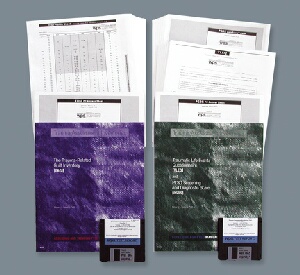 | |

Whether you’re screening for or responding to Posttraumatic Stress Disorder, this set of three related inventories can improve assessment and focus treatment.
The Trauma Assessment Inventories include two sets of materials:
Screening Kit, composed of the Traumatic Life Events Questionnaire (TLEQ) and the PTSD Screening and Diagnostic Scale (PSDS)
Treatment Kit, composed of the Trauma-Related Guilt Inventory (TRGI) and a brief worksheet called the Attitudes About Guilt Survey (AAGS).
The first kit provides a quick, convenient trauma history and PTSD screen, and the second helps clinicians who treat PTSD. Both are intended for use with adults, and both offer hand or computer scoring.
SCREENING KIT:
Traumatic Life Events Questionnaire (TLEQ) and PTSD Screening and Diagnostic Scale (PSDS)
The TLEQ is a brief self-report inventory that asks about current and prior exposure to 21 kinds of potentially traumatic events (from natural disasters to sexual abuse). All events are described in behavioral terms, avoiding emotionally charged words such as “rape” or “abuse.” Clients use a 7-point response format to indicate frequency of occurrence. Consistent with DSM-IV diagnostic criteria, follow-up probes ask whether respondents felt fear, helplessness, or horror during any event experienced. Completed in just 10 to 15 minutes, the TLEQ is written at a 9th-grade reading level.
The PSDS (formerly known as the Distressing Event Questionnaire) is a 38-item self-report inventory that assesses the six DSM-IV criteria for making a diagnosis of PTSD. Respondents are asked to indicate the degree to which they experienced each of 17 symptoms that correspond to the 17 key features of PTSD. They are also asked whether they have experienced any symptom for longer than 30 days and, if so, how long. Other items inquire about specific areas of functioning (such as social life) and trauma-related anger, guilt, and grief. All items are written at an 8th-grade reading level.
Used together, the TLEQ and PSDS constitute a quick trauma history/PTSD screen that is extremely useful in settings (such as emergency rooms) where clinicians have no prior knowledge of a patient’s background or experiences. In mental health clinics, primary care settings, victim service agencies, and battered women’s shelters, the inventories are useful in diagnosing PTSD, assessing symptom severity, making referrals, and monitoring treatment progress.
TREATMENT KIT:
Trauma-Related Guilt Inventory (TRGI)
The TRGI is an event-focused self-report measure of trauma-related guilt. Unlike other trauma instruments, it assesses both cognitive and emotional aspects of guilt associated with a specific traumatic event (a combat experience, sexual abuse, or death of a loved one, for example). In addition, the TRGI is very useful in planning appropriate intervention and monitoring treatment effectiveness.
Designed for use with adult trauma survivors ages 18 and older, the TRGI asks about distorted beliefs that result in irrational guilt. Written at a 5th-grade reading level, the TRGI includes 32 items and a 5-point response scale. It generates six scores:
Global Guilt Distress Hindsight-Bias/Responsibility
Guilt Cognitions Wrongdoing Insufficient Justification
All scores are reliable. They correlate selectively with those from related measures and decrease over the course of treatment.
The TRGI quickly identifies beliefs that can be targeted for modification in cognitive-behavioral therapy. In addition, it provides several resources for work with trauma survivors. Among these is the Attitudes About Guilt Survey (AAGS), a reproducible worksheet that can be used to focus each session of cognitive therapy for trauma-related guilt.
The Trauma Assessment Inventories give clinicians a quick, convenient, and cost-effective way to respond to possible cases of PTSD. In any clinical setting, these instruments permit rapid assessment and targeted treatment.
Component
SET: Includes 1 Screening Kit; 1 Treatment Kit


